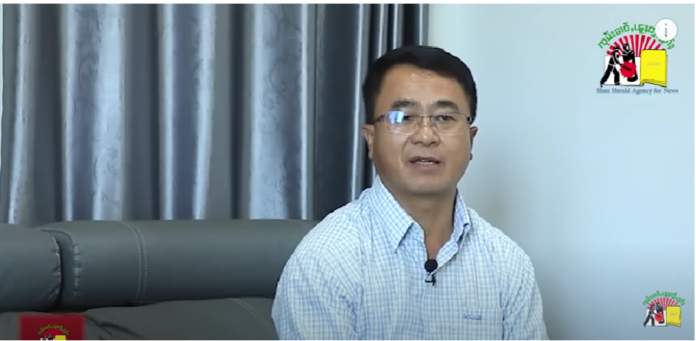An interview with Lt-Col Sai Su, spokesperson for SSPP/SSA
Representatives of the National Solidarity and Peacemaking Negotiation Committee (NSPNC), Shan State Progress Party/Shan State Army (SSPP/SSA), and National Democratic Alliance Army (NDAA) held a meeting in Nay Pyi Taw from January 5 to 7 . SSPP spokesperson Lt-Col Sai Su, was interviewed to learn more about the meeting.
Q: Please tell me what you discussed at the meeting?
A: None of the points we put forward to amend the 2008 Constitution were achieved. So this meeting was just for the record. Nothing specific about politics and military matters was discussed. It’ll be just for the record. The only mutual agreement reached at the meeting was to meet again in March. Other issues discussed include regional development, education, transportation, and electrification.
Q: Did the military council agree on any issues that were discussed at the meeting?
A: Regarding education, they said that they can support those who have passed the matriculation exam and want to attend the University for the Development of National Races, medical universities, etc. in our area if they want to. This applies to children from our headquarters as well as children from the general public. They said they’d help them get admission to their college of choice quickly through our organization. This is one of the demands we have made in terms of education for the benefit of our people, because their leader didn’t pay much attention to the points we raised from our side.
Q: What is the current status of the amendment of the 2008 Constitution?
A: Under the current circumstances, it’s not possible for us to continue the discussion on the 2008 Constitution. But since they didn’t accept such discussion from the first day, it’ll definitely be heated if we discuss it now. So we’ll be able to talk about the amendment only in the next parliament. Right now, it’s being discussed only within the military. Without a government, without a parliament and without parliamentarians, the discussion won’t be valid. Even if we discuss the amendment now, it’ll remain a draft. The military council won’t be able to do anything.
Q: How many times has the SSPP/SSA proposed amendments to the 2008 Constitution?
A: This time we didn’t put forward anything to amend the 2008 Constitution. We didn’t raise this issue again because they didn’t accept it at the last meeting. At the last meeting, we proposed to change some very basic points of the 2008 Constitution. If they had accepted these fundamental changes, we’d have had the opportunity to discuss more important points. That’s why we didn’t give a nod even on the points they put up for discussion. Three groups participated in the meeting and we didn’t go into the points that didn’t concern us.
Q: What does the SSPP/SSA expect from the current peace talks?
A: I don’t want them to include only our armed organization in the peace talks. I want them to bring all the other organizations to the table and find a solution to the political issues together. I don’t want them to solve the problems by military means. With military means, even with air power, the war will drag on for another 70 years. If we don’t find a solution at this meeting, maybe we’ll find it next time. Discussions have less to lose than killing each other. Attacking and killing each other isn’t good for the country either. What I want to say is that we welcome this kind of discussion with any group with open arms.
Q: What else would you like to add?
A: The military council has announced a ceasefire for the whole of 2023. This is the first time such a one-year ceasefire has been announced. Therefore, we’d like to ask the relevant organizations on both sides to build trust during the ceasefire so that we can reduce military action and make it easier for people to earn a living and develop and pacify Shan State.
Sent by Shan Herald.

